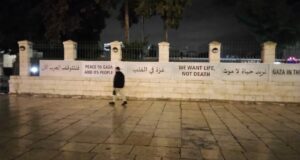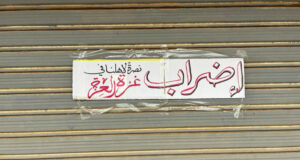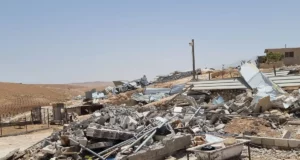Susiya, south Hebron region
September 26th, 2007
A little before 10:00am an international human rights worker began to monitor an Israeli settler working on land located directly next to Susiya settlement on the road leading both to Hebron and Beer Sheva.
This settler, Musi Doyts, is the only person allowed to work this land, in order to maintain his grapes, as the land is currently under dispute in Israeli courts as to who is the rightful owner. The land is owned by Palestinians though has been claimed by settlers in an attempt to expand their area. For more information check previous reports concerning Susiya and this issue.
Doyts allegedly made a promise to the Israeli courts, in an effort to stall their decision, that only he would work on the land for one hour a day, and would not allow any other settler to enter, or work on the land. The international human rights worker (HRW) witnessed Doyts enter the land, from a distance, a little before 10am and monitored him work for about fifteen minutes before approaching the road. The HRW did not cross the road or approach Doyts, and did not speak with him. Instead he took some pictures of Doyts working and waited to see if he would stop working on the land after one hour.
At two points Israeli settlers stopped their cars and spoke with the HRW. One man told the HRW that he was “very stupid” and a “moron,” before driving away, while another sarcastically asked if the HRW “was having fun.” The HRW responded to both men rationally and did not aggravate the situation. Up until this time Doyts and the HRW did not speak to each other.
At about 10:45am Doyts appeared to be leaving the area, as he closed the gate to the property and put on his helmet to get back on his “four wheeler.” At this time a jeep of Israeli soldiers stopped and asked the HRW what he was doing, and the HRW told them that he “was resting.” They (the soldiers) began to leave the area when suddenly another settler vehicle stopped, a small white van, and a settler got out of the vehicle and approached the HRW.
This settler had been in confrontations with the HRW (with a few others) before and can be seen on previous videos, most notably as the “ABA!! settler.”
This settler quickly approached the HRW, and without even a word began attacking him, pushing him and punching him in the sides, attempting to steal the HRW’s camera. The HRW yelled, “what are doing,” and “what do you want?” but the settler continued his attack in an attempt to steal the camera. The Israeli soldiers, who the HRW had spoken with just moments before, stopped their jeep and approached the scene trying to keep the HRW and the settler apart.
At that point the settler made a violent attempt to steal the HRW’s camera and managed to get his hands on the strap, of which the HRW also had a hold. The soldiers, in an attempt to get the two apart, knocked the HRW down onto the ground, with the settler on top. The settler began yelling, in Hebrew, in the HRW’s ear, and continued to punch him in the sides and “kick” the HRW in the head with his knee. At that point some of the soldiers began to yell at the settler, while others appealed to him to get off of the HRW. The settler, after about two minutes of attack, allowed the soldiers to pull him off the HRW.
When the HRW stood up the first thing he noticed was that some soldiers were restraining the settler, who wanted to continue his attack, but were also restraining Musi Doyts, who had entered into the confrontation and was yelling at the soldiers. The HRW, at this point, managed to film. He had not been able to before, as he was alone and under attack.
The soldiers continued to restrain the violent settler, who was upset that the HRW was still filming, and yelled at the soldiers. The soldiers continually told the HRW to sit down who of course refused since he had just been attacked. The HRW kept saying “shouldn’t I press charges against this man,” but the soldiers told him that he “could not ask these questions.”
The soldiers then began asking the HRW for his id, but did not ask the settler for his id. The HRW refused to show his id, at first, to the soldiers, since he believed that the settler should be the one who questioned and checked since he had initiated and carried out the attack. After a little time however the HRW allowed three soldiers to view his id, while he held it in his hand, just so they would stop asking him, in hopes that the process could be taken a step further.
After about five more minutes the soldiers let the settler, who had just attacked the HRW, enter his vehicle and leave the area. The soldiers stood in front of the camera in an attempt to prevent the HRW from filming the settler leave, and continued to restrain Musi Doyts, who remained in the area, and continued to yell at the HRW.
The HRW was obviously very upset that the settler was allowed to leave, and yelled at the soldiers who let him leave. He then asked if he could leave and the soldiers of course told him he could not. At this point another settler appeared on the scene, while the soldiers continued to ask the HRW to see his passport. The HRW at that point completely refused to show his passport to anyone else but the police because the soldiers had let the settler go.
A IOF commander arrived and continually asked to see the HRW’s id, but the HRW refused. He told the HRW that he was going to take him to the police station, but the HRW refused because he knew it was illegal for soldiers to transport or arrest internationals: an act only Israeli police can carry out.
The soldiers asked where the HRW lived, and who he was staying with, and finally said that the area was a closed military zone. The HRW asked to see the papers, but the soldier refused. At that point the HRW said he would leave since it was a closed military zone and began to walk home. He was surprised that the soldiers let him go, but proves that the soldiers had no authority to detain him.
When the HRW began to walk around the corner he noticed that an army jeep was following him, and continued to follow slowly behind him. The HRW tried stopping but the soldiers kept telling the HRW to go home, and continued to follow him. The HRW then stopped walking and sat on the side of the road. The jeep stopped and waited in road, and a few times the soldiers told him to go home. They then said, when the HRW asked why they were following him, that they were “waiting for the police.”
After about twenty minutes the soldiers decided that they would leave with one soldier saying “we are leaving now to get some food.” At that moment however the police arrived and the soldiers stopped there vehicle and spoke with the police.
At that point began the long procedure of being questioned by the police. The HRW told them that he had just been attacked and that the soldiers had let the settler go, and the police said that the HRW could fill out a complaint. The HRW had recently lost his passport, and received a new one, though had not at that point gone to the Ministry of Interior to get a new stamp in his passport. The police asked him about this and the HRW told them of his case.
The police then decided to take the HRW to the police station to make sure he had a valid visa. The HRW spent the rest of the day in Kiryat Arba police station until he was released. The police kept his passport because they could not “be sure” that he had a valid visa, and could not check since it was the Jewish holiday of Sukkot, and the Ministry of Interior was closed.
The HRW must return to the police station until the matter is resolved. As of yet no progress has been made concerning the settler attack.
 International Solidarity Movement Nonviolence. Justice. Freedom.
International Solidarity Movement Nonviolence. Justice. Freedom.


